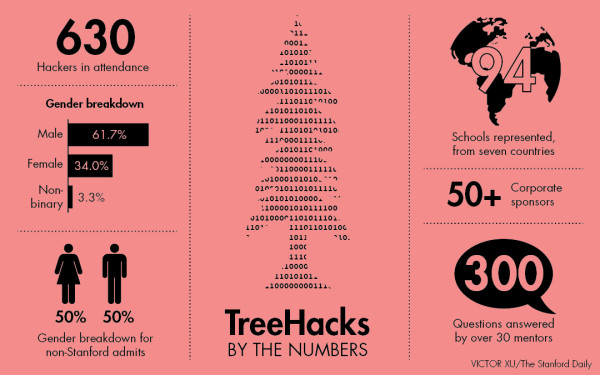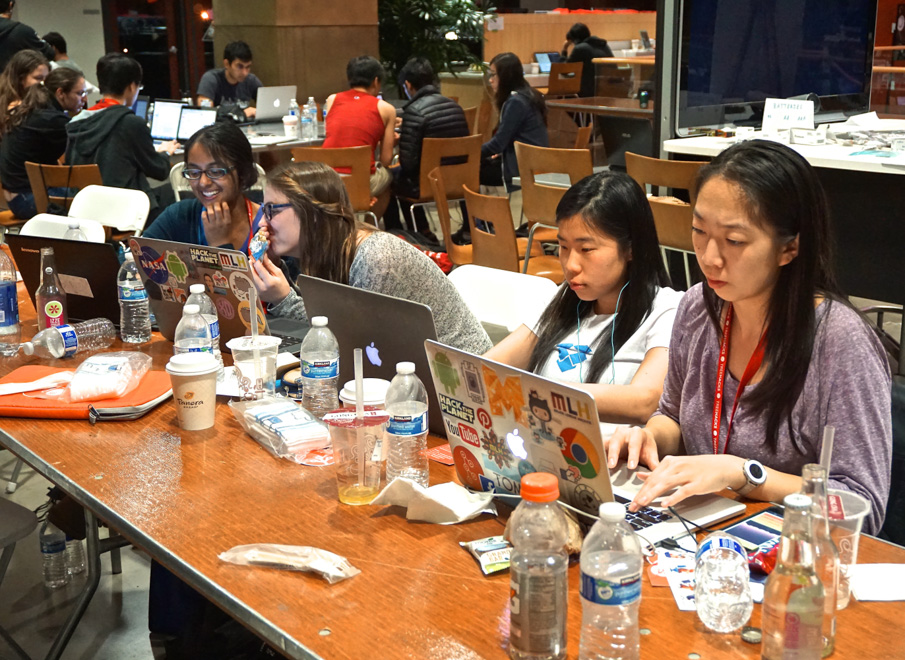Stanford’s large-scale annual collegiate hackathon TreeHacks returned for its second year this past weekend and became the first major hackathon at a university with an accepted applicant pool gender ratio of 50/50. Two of the three winning teams were all-female.

TreeHacks is a 36-hour event in which students from around the world gather to form teams and build something in a single weekend. The hackathon took place in the Jen-Hsun Huang Engineering Center, with the opening and closing ceremonies in Hewlett Teaching Center. At the end of the weekend, 83 teams submitted their work and had the chance to present their projects at an expo. Expo judges then chose the top eight teams to demo during the closing ceremony in front of a panel of six different judges, including partner at Greylock Partners and former CEO of Mozilla John Lilly and Stanford professor of computer science and electrical engineering Mendel Rosenblum.
In addition to the focus on diversity, other changes to TreeHacks this year included increasing mentorship at the event, adding two themed “verticals” around which hackers could base their projects and switching locations from the Alumni Center to Huang. Instead of selecting first, second and third place winners, judges chose winners for three different categories: “Most Creative,” “Most Technically Challenging” and “Most Polished.”
The event received over 3300 applications and had attendees from over 50 different universities and eight different countries. Around 54 percent of the 630 hackers came from Stanford, while the rest traveled from colleges across the country or outside the U.S. A total of 32 participants were international.
“When we were looking for the types of people that we wanted at TreeHacks, one of the biggest considerations was how much of a community member are you,” said co-director Vincent Chen ’18.
“We were able to gauge how much these people would contribute to this cause of bringing women to tech and bringing different groups — no matter what their background — into tech, so that we could start to approach different types of problems from different types of perspectives,” he added.
Chen explained how diversity contributes to TreeHacks’ larger goal of helping hackers “achieve self-efficacy beyond one weekend.” The gender breakdown of applicants was 71 percent male, 26 percent female and less than one percent non-binary, with the rest choosing not to disclose.
During the opening ceremony, organizers also highlighted the two new verticals: TreeHacks Health and TreeHacks Social Good. The ceremony featured talks from Ryan Panchadsaram, former Deputy Chief Technology Officer of the United States, and keynote speaker Timothy Chou, expert in cloud computing and Stanford lecturer in computer science. Chou spoke about how being a student is the best possible business card.
“The quality of a student is not measured by what they know but by the questions they ask,” Chou said in his advice to the crowd.
Organizers emphasized the importance of creating a safe and welcoming community for people of all backgrounds and interests at TreeHacks, and in order to make the hackathon more approachable for beginners, TreeHacks provided “hackpacks” for teams to hit the ground running with a project idea.
Co-director Raphael Palefsky-Smith ’18 drove mentorship efforts and also created an extension for Slack, the mobile and desktop app used for communication over the weekend, through which participants could type “/mentor” along with a question in order to get help quickly for their projects. Over 150 mentors signed up, and according to Palefsky-Smith, the second-most-active mentor’s average response time for the weekend was under a minute.
The event was also enabled by 40 volunteers, 30 organizers and over 100 sponsors, who provided mentors, hosted workshops and gave out prizes over the weekend.
The three winning hacks demonstrated the variety of projects across teams. Pantri, a smart fridge that connected to FitBit and Amazon Alexa, won “Most Creative”; Recon, a search drone that classified objects and could be controlled through Amazon Alexa, won “Most Technically Challenging”; and The Queen’s Speech, a virtual reality app that used Google Cardboard to provide feedback on users’ public speaking skills, won “Most Polished.” The teams won concert tickets, tickets for a flight to a city of their choice and a dinner at a Michelin-star restaurant respectively.
But beyond generating cool projects and prizes, TreeHacks aimed to focus on the hacker experience. Co-director Christina Wadsworth ’18 spoke about the positive feedback many of the participants provided through a survey after the event.
“We got one response that was a 10-sentence paragraph about how [the participant] literally had to focus on nothing but building things,” Wadsworth said.
“That’s the ideal experience — a hacker who, from the moment they leave their house or wherever they’re living to come to TreeHacks, they have to focus on nothing but working and building and learning,” she added. “To hear that that was the case for some people was my favorite part of the weekend by far.”
[photoshelter-gallery g_id=”G00007ooqRFtDZjs” g_name=”TreeHacking” width=”600″ f_fullscreen=”t” bgtrans=”t” pho_credit=”iptc” twoup=”f” f_bbar=”t” f_bbarbig=”f” fsvis=”f” f_show_caption=”t” crop=”f” f_enable_embed_btn=”t” f_htmllinks=”t” f_l=”t” f_send_to_friend_btn=”f” f_show_slidenum=”t” f_topbar=”f” f_show_watermark=”t” img_title=”casc” linkdest=”c” trans=”xfade” target=”_self” tbs=”5000″ f_link=”t” f_smooth=”f” f_mtrx=”t” f_ap=”t” f_up=”f” height=”400″ btype=”old” bcolor=”#CCCCCC” ]
Contact Kylie Jue at kyliej ‘at’ stanford.edu.
